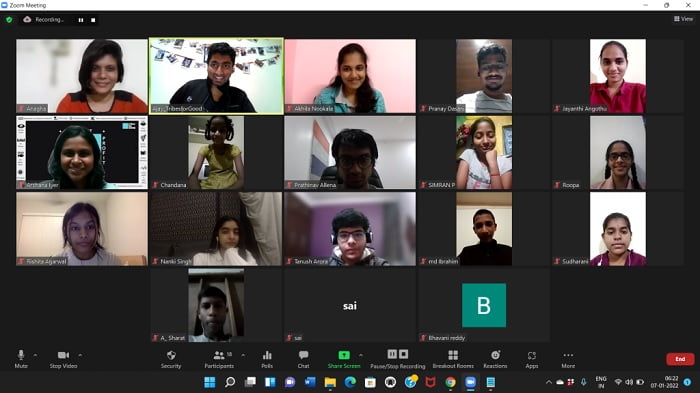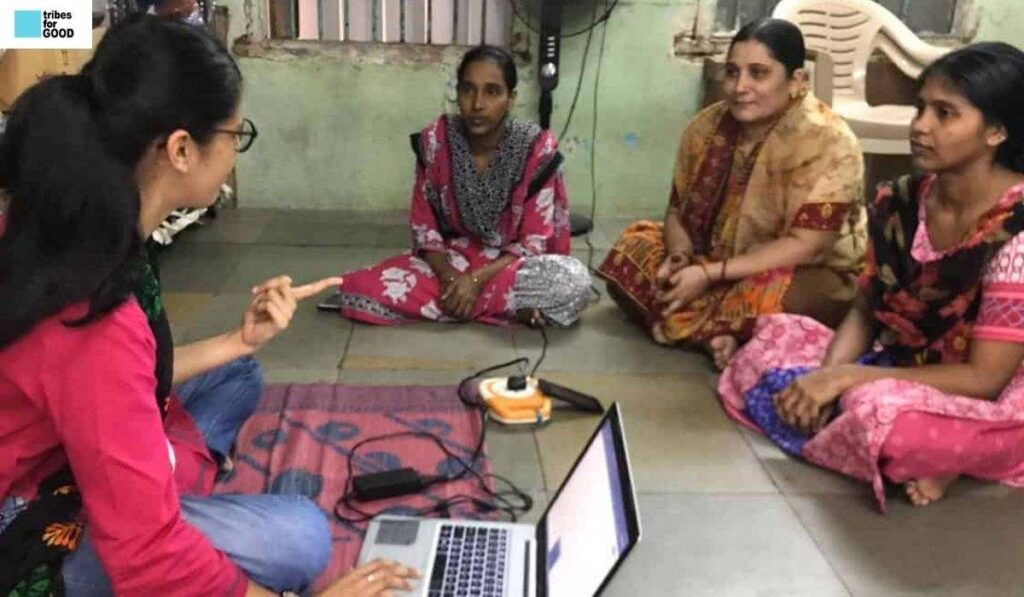TribesforGood Change Warriors: Passion is an intense desire that can get you to do amazing things. Passion is an emotion to be acted upon. They could run wild and lose on passion if not nudged in the right directions from time to time. Community service is a form of volunteering intended to help people or serve the wider society. It is often aimed at improving the lives of others but more often than not transforms in the process. For example, it sets up a food bank in a society where sufficient food supply might not be adequate. Knowing whether the group you want to help needs your help to create a positive social impact is crucial.
The United Nations International Children’s Emergency Fund (UNICEF) report pointed out that 76 per cent of parents of students aged 5-13 years reported drop-in learning levels during remote learning widened the learning outcome gap. Instead of resigning to despair, a few young changemakers Sreshtha, Nanki, Tanush, Maehir, Rishita and Prathinav, joined tribes to teach students from public schools virtually joined tribe teach students from public schools almost. TribesforGOOD, in December 2021, ran the Young Minds for Future program, which brought passionate students from diverse backgrounds on one platform, which ignited the co-learning spirits in them all. The 3-week program saw intense learning of Digital tools like Google Docs, Slides, Forms and primer in Cyber safe habits.
Going Beyond Teaching
Young Minds Future is an ardent attempt to shun frigid learning and move towards critical thinking. The student-teachers did not just tell them about the tools but emphasised how to use them. They prepared interactive modules to demonstrate the working of the digital tools and opened the space for real-time practice. The program focused on making the learners aware of the tool and how it works and highlighting how it could be actively applied in real-life situations like making presentation pitches, sending feedback and surveys, writing professional emails, refining resumes and applications aid projects.
Co-learning at its best! The peer learning approach saw their student-teachers hand-holding their peer learners and exploring different ways of teaching a topic. Prathinav notes that while taking on the role of a teacher, he became aware of new aspects of the usual tools which he wasn’t aware of earlier. Thus, teaching was not merely a one-way street but an active exchange of ideas and experience which also helped student-teachers learn.
With a high Mentor-student ratio (1 mentor to 2 students), student-teachers could connect closely with learners, interacting and helping build conceptual understanding. The mentors and students were clubbed in different break-out rooms to discuss and work on their projects. Such focused attention contributed significantly to building bonds and trust amongst these students enabling collaboration to work in groups. They saw the creative use of digital tools applied to explain social issues during the final presentation for the graduation day.
Leaping over Barriers
The student-teachers intimately learnt a fundamental aspect of Teaching on the go. When set down, it usually looks like a perfect idea. But more often, the journey of an idea to action is much more dynamic and responsive to obstacles and reality. Their student-teachers promptly realised how big a barrier language was when it came to explaining technicalities solely in English. Most young learners are disadvantaged only due to a lack of English speaking skills. Their student-teachers understood they would have to go beyond the usual pedagogy this time. Language is not only a way of communication with peers but an integral component of human emotion. It has been widely believed that young students learn better when taught in their mother tongue.
Shreshta, quickly realising this, spontaneously explained an entire module in Telugu. They saw a unique multilingual classroom that connected the student-teachers to their peer learners.
The digital divide kept at least 30% of students completely out of online classrooms; the problem in rural areas was exacerbated. The quality of internet and electricity being patchy eroded the access further. They promptly recharged the phone of a few learners with internet-data packs and were thrilled to see them attending and participating in the dynamically.
Changemaker Nanki Singh suggested that training programs can be organised over smartphones as most government school children do not have access to laptops. The workshops can be technically simple initially with catchy images and interactive videos, which would cultivate interest and curiosity among the students.
It prods to mull over the fact that good students are not merely born but made- with constant care, nurture and sculpting. YMF created an ecosystem for young teachers to see the reality of education from close quarters, thus, expanding their understanding of the world beyond their experience. They implemented solutions by innovating spontaneously, which benefitted learners from public schools exposed to new ideas and challenges, igniting their innate potential. Student-learners leaping over language barriers bloomed gradually as they confidently interacted with peers and mentors.

Simran Patra (Sambalpur, Odisha): I could practice the digital tools taught during the course in real-time. I could connect their passion for learning about different art forms in India. I wish to create a repository of the art information in other languages, which can easily be accessed through an app and create awareness on social media. The goal is to revive the traditional folk arts and bring them to us.
Tangibly Young Minds for Future aims to open up a vista for students from public schools to be better placed to study in top colleges, innovate and secure better careers. However, the subtle skills of public speaking, self-awareness and metacognition are outcomes of intimate classrooms like these, where kids enjoy learning new things, open up to each other, bond and share. Having built a good foundation in Phase one, the Young Minds for Future Program in Phase Two and Three would intensely focus on written communication and public speaking with the outcome of an Internship Opportunity at TribesforGOOD, which could enhance access to opportunities that can help them build a brighter- successful future. Young change warriors also want to bring coding and gaming to the classroom, an avenue that sees enthusiasm beyond language and regional barriers.
The Young Change Warriors Tribe: Sreshtha, Nanki Singh, Tanush Arora, Maehir, Rishita and Prathinav Allena from schools TISB, Pathways school Gurgaon, Ahlcon International School, The Shri Ram School – Aravali, Chirec International School from the cities Banglore, Delhi, Gurgaon, Hyderabad. Tribes for Good is always looking to partner with non-profits who want to run this program for their students.

